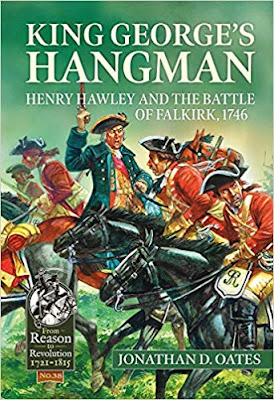‘Hangman Hawley’ is one of the villains of the ‘45 and holds a prominent place in Jacobite demonology but was also held in contempt by those who hated the Jacobite cause. He is reputed to have been a man who enjoyed hanging his own soldiers, looting from his enemies, and harrying defeated foes, yet he was defeated in the only battle that he ever held command. No one has come forward to defend his reputation. However, the Duke of Cumberland, commander in chief of the British army in the 1740s and 1750s declared him to be a highly capable cavalry officer. He certainly had the experience; being given his first command when less than ten years old and who fought in Spain, Flanders, Scotland and Germany, rising from ensign to lieutenant general, being wounded in the process. This book covers both Hawley’s professional and personal life. In both he was a figure of controversy. Many hated him – especially Jacobites and civilians – but among soldiers his reputation was more mixed. Drawing on numerous sources this is the first attempt to provide a full length study on an important and controversial figure in eighteenth century British history.
31 Aug 2019
King George's Hangman: Henry Hawley and the Battle of Falkirk, 1746
‘Hangman Hawley’ is one of the villains of the ‘45 and holds a prominent place in Jacobite demonology but was also held in contempt by those who hated the Jacobite cause. He is reputed to have been a man who enjoyed hanging his own soldiers, looting from his enemies, and harrying defeated foes, yet he was defeated in the only battle that he ever held command. No one has come forward to defend his reputation. However, the Duke of Cumberland, commander in chief of the British army in the 1740s and 1750s declared him to be a highly capable cavalry officer. He certainly had the experience; being given his first command when less than ten years old and who fought in Spain, Flanders, Scotland and Germany, rising from ensign to lieutenant general, being wounded in the process. This book covers both Hawley’s professional and personal life. In both he was a figure of controversy. Many hated him – especially Jacobites and civilians – but among soldiers his reputation was more mixed. Drawing on numerous sources this is the first attempt to provide a full length study on an important and controversial figure in eighteenth century British history.
Labels:
Bookss
Subscribe to:
Post Comments (Atom)

No comments:
Post a Comment